- Home
- Peter Straub
The Hellfire Club Page 2
The Hellfire Club Read online
Page 2
“I wondered where you were,” she said.
“Well, now you know.” He tapped his pencil against the notebook and managed to smile. Faced with a choice, he chose kindness. “You could watch this with me.”
She sat beside him on the sofa. Davey patted her knee and focused on the movie.
“What is this?”
“Night Journey. You were making so much noise I got out of bed, and when I looked at the paper, I saw it was on. I have to see the thing anyhow, so I might as well do it now.”
“You have to take notes on Night Journey?”
“We’re having some trouble with the Driver estate.” He pointed the remote at the screen and raised the volume. Distant in the hazy swamp, wolves howled. More peeved than she wished to be, Nora watched the boy make his way beneath the monstrous trees. “It’ll be okay,” Davey said. For an instant he took her hand. She squeezed it and tucked up her legs and rested her head on his shoulder. Davey twitched, signaling that she was not to lean on him.
Nora slid away and propped her head on the back of the sofa. “What kind of trouble?”
“Shh.” He leaned forward and picked up the pencil.
So she was not to speak. So she was a distraction. For some reason Davey had to get out of bed in the middle of the night to take notes on the film version of Night Journey, Hugo Driver’s wildly successful first novel and the cornerstone of Chancel House, founded by Lincoln Chancel, Davey’s grandfather and Hugo Driver’s friend. Davey, who took enormous pride in the association, had read Night Journey at least once a year since he was fifteen years old. Anyone less charitable than Nora might have said that he was obsessed with the book.
4
MANY WERE OBSESSED with Hugo Driver’s first novel. One of Davey’s occupations at Chancel House was answering the requests for photographs, assistance with term papers and theses, and other mail concerning the writer that flowed into the offices. These missives came from high school students, stockbrokers, truck drivers, social workers, secretaries, hairdressers, short-order cooks, ambulance drivers, people who signed their letters with the names of characters in the novel, also famous crazies and sociopaths. Leonard Gimmell, who had murdered the fourteen children in his second-grade class during an outing to the Smoky Mountains, wrote once a week from a state prison in Tennessee, and Teddy Brunhoven, who had appeared in front of a recording studio on West Fifty-fifth Street and assassinated the lead singer of a prominent rock and roll band, communicated almost daily from a cell in upper New York State. Both men continued to justify their crimes with complex, laborious references to the novel. Davey enjoyed responding to Hugo Driver’s fan mail much more than the other duties, matters like crossword puzzles and paper plates, wished on him by his father.
Twice Nora had begun Night Journey, but she never made it past the chapter in which the boy hero succumbed to an illness and awakened to a landscape meant to represent death. Bored by fantasy novels, she could smell the approach of trolls and talking trees.
Davey also revered Twilight Journey and Journey into Light, the less successful sequels, but had opposed the decision to sell the film rights to Night Journey. On the movie’s release a year ago, he had refused to see it. Any movie of the novel would be a failure, a betrayal. You could make good movies of second-rate books” movies based on great books left an embarrassing stink. Whether or not this rule was generally true, it had applied to Night Journey. Despite forty million dollars’ worth of special effects and a cast of famous actors, the movie had been greeted by hostile reviews and empty theaters. It disappeared after two weeks, leaving behind the stink Davey had predicted.
5
FORBIDDEN TO SPEAK, Nora slumped back and watched the di-saster unfurl. All that money had bought unconvincing trees, tattered clothes, and a great deal of fog. The boy came through the last of the trees and found himself on a desolate plain. Here and there, plaster boulders floated up out of silver mist. Distant wolves howled.
Bent over his notebook, Davey frowned like an earnest student taking notes in a class he didn’t like. Seriousness and concentration increased the accidental likeness between them. At forty, he still had the large, clear eyes and almost translucent skin that had both attracted and repelled her when they had first met. Her first coherent thought about him, after she had adjusted to the unexpected resemblance between them, had been that his version of her face was too pretty. Any man who looked like that had to be impossibly vain. A lifetime of being indulged, petted, and admired would have made him selfish and shallow. Added to these insurmountable failings was his age. Men about ten years younger than herself were still blind, ambitious babies with everything to learn. Most damning of all, an envelope of ease and carelessness surrounded Davey Chancel. Her father, a foundry worker and lifelong union man, had known that such people were the enemy, and nothing she had seen or experienced had taught her otherwise.
Eventually Nora had learned that only the last of her first impressions had been correct. It was true that he had been born into a wealthy family, but Davey was too insecure to be vain. He had been mercilessly criticized, not coddled, all his life. Oddly vulnerable, he was thoughtful” his ambitions had to do with pleasing others and publishing good books. He had one quality that might have been considered a flaw, even a serious flaw, but Nora had decided that this was a trait rather than a serious problem. He was imaginative, and imagination, every-one agreed, was an exceedingly Good Thing. And he needed her. It had been seductive, being needed.
“It’s like they set out to trash the book. Every single thing is wrong.” He gave her an exasperated glance. “Whenever they come to a big moment, they squash it flat. Pay attention, you’ll see what I mean.”
Nora watched the boy trudge through the fog.
“The pace is all wrong, so is the tone. This should seem almost exalted. Everything should be filled with a kind of radiance. Instead of experiencing profound emotions, the kid looks like he’s going out for a sandwich. I bet it’s five minutes before we see Lord Night.”
Nora had no idea who Lord Night was and in fact thought that Davey had said Lord Knight.
“He’s going to plod along forever, and in the meantime, the Stones of Toon look totally fake.” He made another note. “You saw Gentle Friend, didn’t you? When you first came in?”
Nora supposed that the old man in rags must have been Gentle Friend. “I think so.”
“That proves my point. Driver’s Gentle Friend is a heroic aristocrat who has renounced the world, and this one’s a dirty hermit. When he tells Pippin to be brave, you don’t have the feeling that he knows any more about bravery than anyone else. But in the book . . . well, you know.”
“Sure.” Without ever telling an actual lie, Nora had allowed Davey to imagine that on her second attempt she had read the novel and seen that it was a masterpiece.
“Gentle Friend is passing on the central message of his life—that bravery has to be re-created daily. Because he knows it, Pippin can know it, too. In this travesty, the scene is pure cardboard. Okay, here comes Lord Night, completely wrong, of course.”
A big, brindled animal that could have been either a dog or a wolf leaped onto the boulder in front of the boy. In pairs, dogs or wolves appeared on the other boulders. The boy looked up at the animals with an absence of expression which might have been intended to represent determination.
“Duh, and who, I wonder, might you be? See, you don’t have any idea that this is why Pippin had to really get it about bravery. He has to prove himself to Lord Night, and he’s scared out of his wits. Would that mutt scare you?”
“Probably,” Nora said.
“Lord Night is scary, his teeth are like razors, he’s magic. He’s the reason for all the emotion that should have been, but wasn’t, present at the start of this scene. We know we’re supposed to meet this dangerous creature, and who shows up instead? Rin Tin Tin.”
To Nora, the animal staring down from the rock looked exactly like a wolf. It had been fed before t
he scene, but just in case, its trainer had been standing immediately off camera with a tranquilizer gun. The wolf was the best thing in the movie. Utterly real, it was a lot more impressive than what it was supposed to be impersonating. The boy had so little expression on his face because he was too scared to act. He was a sensible boy.
Then Nora saw that Davey was right” the movie wolf was only a dog. She had turned him into the Wolf of Westerholm, the unknown man who had stolen away the corpse of funny, desperate, appealing Natalie Weil and murdered four other women. And the boy playing Pippin Little wasn’t scared or sensible, he was just a lousy actor. Looking at him, she had seen her own fear.
“Of course they screw up the dialogue,” Davey said. “Lord Night doesn’t say, ‘How are you called, child?’ He knows his name. What he says is ‘Pippin Little, do you travel with us tonight?’ ”
Some renegade part of Nora had overlooked the savagery of the unknown man to remark on his reality. The unknown man strolled here and there on Westerholm’s pretty, tree-lined streets, delivering reminders. He was like war.
The animal in the movie opened his long mouth and said, “Will you come with us tonight, Pippin Little?”
Davey slapped his forehead. “I suppose they think that’s an improvement.”
Nora supposed that when she caught herself finding valuable moral lessons in murder it was time to get out. Year after year, Westerholm proved that Natalie Weil had been charitable about its pretensions. Leo Morris, their lawyer by virtue of being Alden and Daisy’s lawyer, had chartered the QE2, all of it, for his daughter’s sweet-sixteen party. One of their neighbors had installed a bathtub made of gold in the bathroom off the master bedroom and regularly invited his guests to step in and check it out.
For at least a year, an idea had been growing within Nora, retreating in the face of all the objections to be made against it, also in the face of Davey’s certain rejection, and now this idea returned as a conviction. They had no business living here. They should sell the house and leave Westerholm. Alden and Daisy would bluster and rant, but Davey made enough money to buy an apartment in New York.
Yes, Nora said to herself, it is time to wake up. It was simple, it was true, it was overwhelming. The move would be difficult, a risk, a test, but if she could retain this sense of necessity, in the end their lives would improve.
She glanced over at Davey, almost fearful that he had heard her thoughts. Davey was giving her a look of shocked disbelief. “Isn’t that incredible?”
“What’s incredible?”
He stared. “You have to read the book again. They cut all of Paddy’s tale and went straight to the Field of Steam. Which means that the first whole set of questions and answers is out, and so are the rats. It’s crazy.”
“Imagine it without the rats.”
“It’s like The Wizard of Oz without the flying monkeys. It’s like The Lord of the Rings without Sauron.”
“Like Huckleberry Finn without Pap.”
“Exactly,” Davey said. “You can’t change these things, you can’t do it.”
We’ll see about that, Nora said to herself.
6
SOMETIME LATER SHE came groggily awake with her head in Davey’s lap. A wide-shouldered man with crinkly eyes and a heroic beard was carrying the boy through an enormous wooden door. The soundtrack, all shining violins and hallooing trombones, applauded. This stage of events was coming to an end. Nora remembered a sense of resolve, but could not remember what she had resolved to do. With the memory of her own determination came the return of renewed strength. She had resolved to act. Time to wake up. She and Davey would turn their backs on Westerholm and move the forty crucial miles into New York City. It was time to be a nurse again.
Or if not that, she immediately thought, something else. Nora’s last experiences of nursing were a radioactive substance too hot to touch. Until the final month, the radioactivity had expressed itself privately, in nightmares, stomach problems, sudden explosions of temper, depressions. The gleeful demons had put in occasional appearances. Neither Nora nor Davey had connected this stream of disorder to her work at Norwalk Hospital until her last month, when Nora herself had become radioactive. An improperly considered but nonetheless necessary action had for a time brought her into the orbit of the police. Of course she had not committed a crime. She had behaved morally, not immorally, but recklessly. After she had agreed, naturally to the regret of all, to “take a sabbatical,” she had signed half a dozen papers and left the hospital too unhappy to pick up her final paycheck.
Nora’s reckless but moral action had at first resembled kidnapping. The year-old son of a prominent man had been brought in with a broken leg and bruising around the chest. A fall downstairs, the mother said. She had not seen it, but her husband had. Sure did, said the husband, a sleek item in a Wall Street suit. His skin had an oily shine, and his smile was amazingly white. Took my eye off the kid for a second, and when I looked back, bam, almost had a heart attack. Half an hour after the child was admitted, both parents left. Three hours later, stuffed bunny under his pin-striped arm, back came smiling Dad. Into the private room he went, came out fifteen minutes later, even oilier, smiling hard. Nora checked on the child and found him all but unconscious.
When she reported what she had seen, she was told that the father could not be responsible for any injuries to the child. The father was a wizard, a financial genius, too noble to beat his own child. The next day Mom and Dad came in at eight. Dad left after half an hour, Mom went home at noon. At six, just as Nora was leaving, Dad returned alone. When Nora checked in on the child the next day, she learned that he had suffered a mysterious “failure” the previous evening but was now recovering. Once again she reported her suspicions to her superiors, once again she was rebuked. By this time, two or three other nurses silently agreed with her. The parents had been in again at eight, and these nurses had observed that the wizard seemed to be merely acting the role of a worried parent.
When the father returned that evening, Nora, after an hour railing in vain at administrators, planted herself in the child’s room until Dad asked to be left alone with his baby, at which point she left long enough to make three telephone calls—one to an acquaintance who ran the Jack and Jill Nursery School on the South Post Road in Westerholm, another to the chief of pediatrics, the third to Leo Morris, her lawyer. She said, I am saving this child’s life. Then she reported back to the room. The irritated wizard said that he was going to file a complaint and bustled out. Nora wrapped up the child and walked out of the hospital. She drove to the Jack and Jill Nursery, delivered the child into her friend’s care, and returned to face the storm she had created. Four months after the turmoil had subsided, the wizard’s wife issued a statement to the press saying that she was seeking a divorce on the grounds that her husband regularly beat both herself and their son.
“At least they got one thing right,” Davey said. “The Green Knight really does look like a grown-up Pippin. But you can’t tell that Pippin realizes it.”
On the screen, electronic manipulation was transforming the bearded man’s face, stripping away years by smoothing wrinkles, shortening his hair, drawing in the planes of his cheeks, leaving the beard as only a penumbra around a face almost identical to the boy’s.
“You need the words. His own salvation lay within himself. Pippin had come to the great truth behind his journey through vast darkness. Life and death stirred beneath his own hands, and his hands commanded them.” Davey recited the words unemotionally but without hesitation.
“Oh, of course,” Nora said. “Absolutely.”
For less than a second, the boy’s face shone out from within the shadow of the man’s, and then the wild hair, frothing beard, and hard planes of the forehead and cheekbones locked back into place. The man carried the boy down a grassy slope. Sunlight gilded his hair and the tops of his arms. On the hill behind the man and the boy stood a huge door in a dark frame, like a mirage. Before them in the fold of a valley at t
he bottom of the hillside, oaks the size of matches half-hid a white farmhouse.
She turned her head to Davey and found him looking not at the screen but down at her with a suggestion of concern in his eyes.
“Kind of pretty,” she said.
“So it’s completely wrong.” His eyes darkened. “That’s not Mountain Glade. Does it look like there’s a secret in that place? Mountain Glade isn’t pretty, but it contains the great secret.”
“Oh, sure.”
“It’s the whole point,” Davey said. His eyes had moved backward into his head.
“I better go back to bed.” Nora pushed herself upright without any assistance from Davey. “Isn’t it almost over, anyhow?”
“If it is over,” he said.
Onscreen, the bearded man faded toward transparency. When she stood up and took an undecided step away from the sofa, he vanished altogether. The boy sprinted toward the farmhouse, and then the cast list obliterated his image.
Nora took another step toward the door, and Davey gave her a quick, unreadable glance. “I’ll be there in a little while,” he said.
Nora climbed the stairs, again reflexively checking that the front door was locked and the security system armed. She slid back into bed, felt the night sweat soak through her nightgown, and realized that she had to convince Davey that her desire to leave Westerholm had nothing to do with Natalie Weil or the human wolf.
Half an hour later, he entered the bedroom and felt his way along the wall until he found the bathroom. Without really being aware that she had fallen asleep, Nora opened her eyes from a dream in which Dan Harwich had been looking at her with colossal, undimmed tenderness. She rolled over and pushed her head deep into the pillow. For a long time Davey brushed his teeth while the water ran. He washed his face and yanked a towel off the rack. He spoke a few reproachful words she could not make out. Like his mother, when alone or unobserved he often conducted one-sided conversations with some person not present, a habit which Nora thought could not technically be described as talking to yourself. The bathroom light clicked off, and the door opened. Davey groped toward the bed, found the bottom of the mattress in the dark, and felt his way up his side to pull back the duvet. He got in and stretched out along his edge of the bed, as far from her as he could get without falling off. She asked if he was all right.

 Poe's Children: The New Horror: An Anthology
Poe's Children: The New Horror: An Anthology Koko
Koko The Throat
The Throat Julia
Julia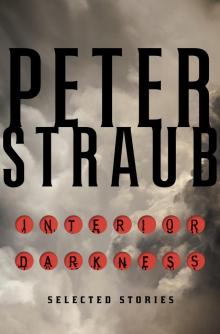 Interior Darkness: Selected Stories
Interior Darkness: Selected Stories A Dark Matter
A Dark Matter Floating Dragon
Floating Dragon Houses Without Doors
Houses Without Doors Mr. X
Mr. X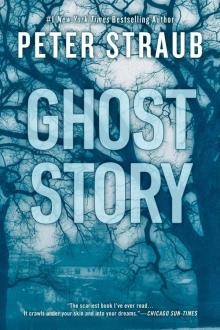 Ghost Story
Ghost Story Mystery
Mystery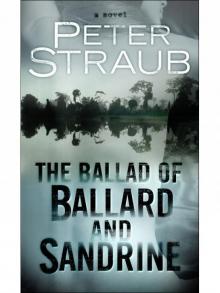 The Ballad of Ballard and Sandrine
The Ballad of Ballard and Sandrine Magic Terror
Magic Terror In the Night Room
In the Night Room Lost Boy Lost Girl
Lost Boy Lost Girl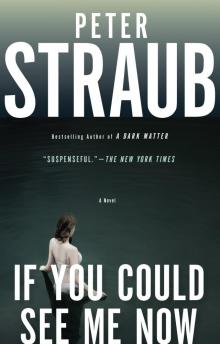 If You Could See Me Now
If You Could See Me Now The Hellfire Club
The Hellfire Club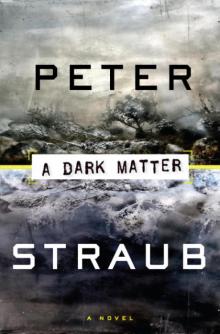 A Dark Matter: A Novel
A Dark Matter: A Novel Koko brt-1
Koko brt-1 Shadowland
Shadowland Mystery brt-2
Mystery brt-2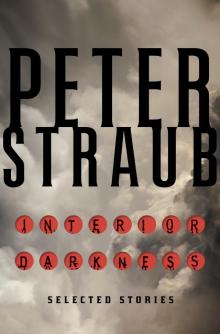 Interior Darkness
Interior Darkness Poe's Children
Poe's Children